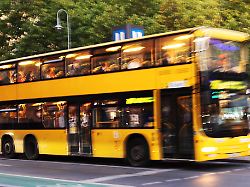Shortly before the public transport shutdown
FDP and Union for obligation to arbitrate before strikes
February 1, 2024, 10:08 p.m
Listen to article
This audio version was artificially generated. More info | Send feedback
After the train drivers’ third strike, there is a crack in the traffic lights: While the FDP agrees with the Union and wants to legally limit strikes in the future, the SPD says no. A nationwide warning strike will begin in public transport in a few hours.
Immediately before the nationwide warning strikes by public transport workers this Friday, politicians and experts are calling for the rules on the right to strike to be tightened. “Strikes in areas such as rail transport not only affect the employers involved in the conflict, but also many citizens and companies in Germany that rely on passenger and freight transport by rail,” said Pascal Kober, labor market policy spokesman for the FDP parliamentary group, the ” Daily Mirror”.
In addition to the unreasonable demands on customers, there is also great economic damage, says Kober. “Strikes of this type and on this scale therefore raise the question of proportionality and therefore the consideration of whether legal regulations are necessary,” Kober continued to tell the newspaper. “This includes, for example, whether an arbitration procedure should first take effect.”
There were also renewed calls from the opposition to regulate the industrial dispute more closely. “Nobody wants to ban strikes,” said Gitta Connemann, federal chairwoman of the SME and Economic Union, to the paper. However, the CDU politician qualified: “The strike hammer hits the wrong people. Strike, yes – but not like that.” This type of strike endangers Germany as a business location and is irresponsible with regard to the operation of important infrastructure. “Strike must not be the first resort, but must be the last resort.” The lawyer calls for an obligation to announce strikes at least four days in advance so that the authorities are able to install an emergency service to operate particularly critical infrastructure such as hospitals or retirement homes. “These kinds of rules have been in place for a long time in other countries.”
Labor lawyer: The unions decide on proportionality
The FDP and CDU receive support from labor law professor Gregor Thüsing. He criticized the fact that there are no precise regulations: “In practice, this usually means that strikes are proportionate when the unions say they are proportionate,” Thüsing told the newspaper. “Politicians would have the power to draw limits through a strike law,” he continued. The labor lawyer also demands, among other things, that a strike should only be permitted if arbitration has failed. Or that strikes should be announced earlier and accompanied by more extensive emergency services.
However, the SPD rejected these plans: “The right to strike is an important fundamental right and a decisive factor for fair wages and good working conditions,” said the labor market policy spokesman for the SPD parliamentary group, Sebastian Roloff, to the “Tagesspiegel”. “Tariff autonomy is the core of the social market economy and economic success in Germany,” Roloff continued, pointing out that there are relatively few strikes in Germany compared to other countries such as France, Denmark, Canada or even Great Britain. “Accordingly, a restriction is prohibited.”
After the third and longest strike by the train drivers’ union GDL ended on Monday, Verdi wants to paralyze local public transport nationwide with an all-day warning strike. Around 80 cities in 15 federal states and 40 districts are affected. There will only be no actions in Bavaria because there are currently no collective negotiations taking place there. In Berlin, the strike should also be limited to the morning. Passengers in the regions have to prepare for extensive restrictions on bus, road and subway traffic.
